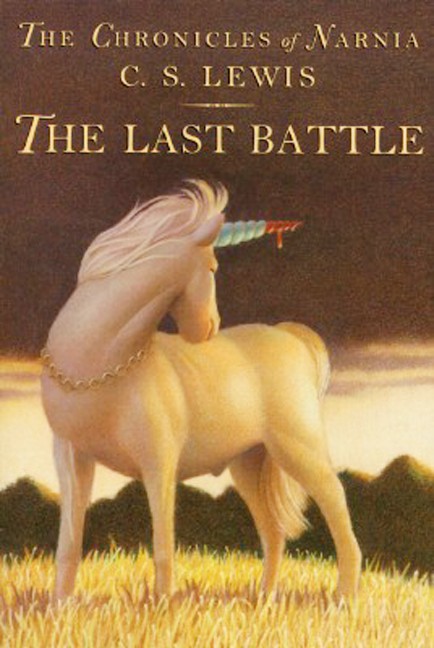I wrote the below a week ago but didn’t publish. Since conversations with my friend Grace inevitably spend some time on religion (she is a struggling yet deeply committed Christian who has always been pretty good at letting me be different without evangelizing), I thought it slightly relevant now. We had even been talking briefly about CS Lewis.
 Quite some time ago, I ran across a lost, dog-eared copy of C.S. Lewis’s The Last Battle (edition cover image at right).
Quite some time ago, I ran across a lost, dog-eared copy of C.S. Lewis’s The Last Battle (edition cover image at right).
Way back when I was a child, in my efforts to read the Narnia books, I’d never read this one – at the time, I’d become annoyed with the overt Christian symbolism of these books. I later went on to greatly appreciate much of Lewis’s other writing – I profoundly love his Space Trilogy even today, and consider those books to be very important and formative books for me, even though they’re just as overt in their Christian symbolism as the Narnia books. I read a number of his non-fiction works, too, during my long struggle with (or against) faith in my 20’s, including Surprised by Joy and The Screwtape Letters. He is probably my favorite Christian writer.
So about a month and a half ago I started reading The Last Battle – it joined the giant “pile” of books-in-progress that is the entirety of my apartment’s flat surfaces. I finished it a few days ago.
The symbolism is undeniable, but his take is one I can appreciate despite my own divergent belief system. I don’t like some of the seeming racism that peeks through the symbolism, however – especially the caricature of Islam that is the prominent role played by the humans called Calormenes in the story.
So one thing that surprised me and that I deeply appreciate is the tale of the Calormene who gets caught up in Aslan’s (Christ’s) procession up into heaven at the end of the book. The Calormene is a faithful Calormene – he has been a loyal servant of “Tash” (Allah / The Devil) and so he doesn’t understand how it is Aslan has welcomed him. Aslan explains that (I’ll paraphrase and interpret, here, extensively) it’s not his dogma that matters, but his works. His faithfulness, his kindness, his loyalty – these are the things Aslan looks for and rewards. “I take to me the services which thou hast done to him [Tash]. For I and he are of such different kinds that no service which is vile can be done to me, and none which is not vile can be done to him.” Finally, “Beloved, said the Glorious One, unless thy desire had been for me thou wouldst not have sought so long and so truly. For all find what they truly seek.”
That last sentence, “For all find what they truly seek,” has an almost Buddhist character.
If only more people who claim to be Christian could view my own divergent path with this kind of openminded equanimity – I’d have less quarrel with them.
